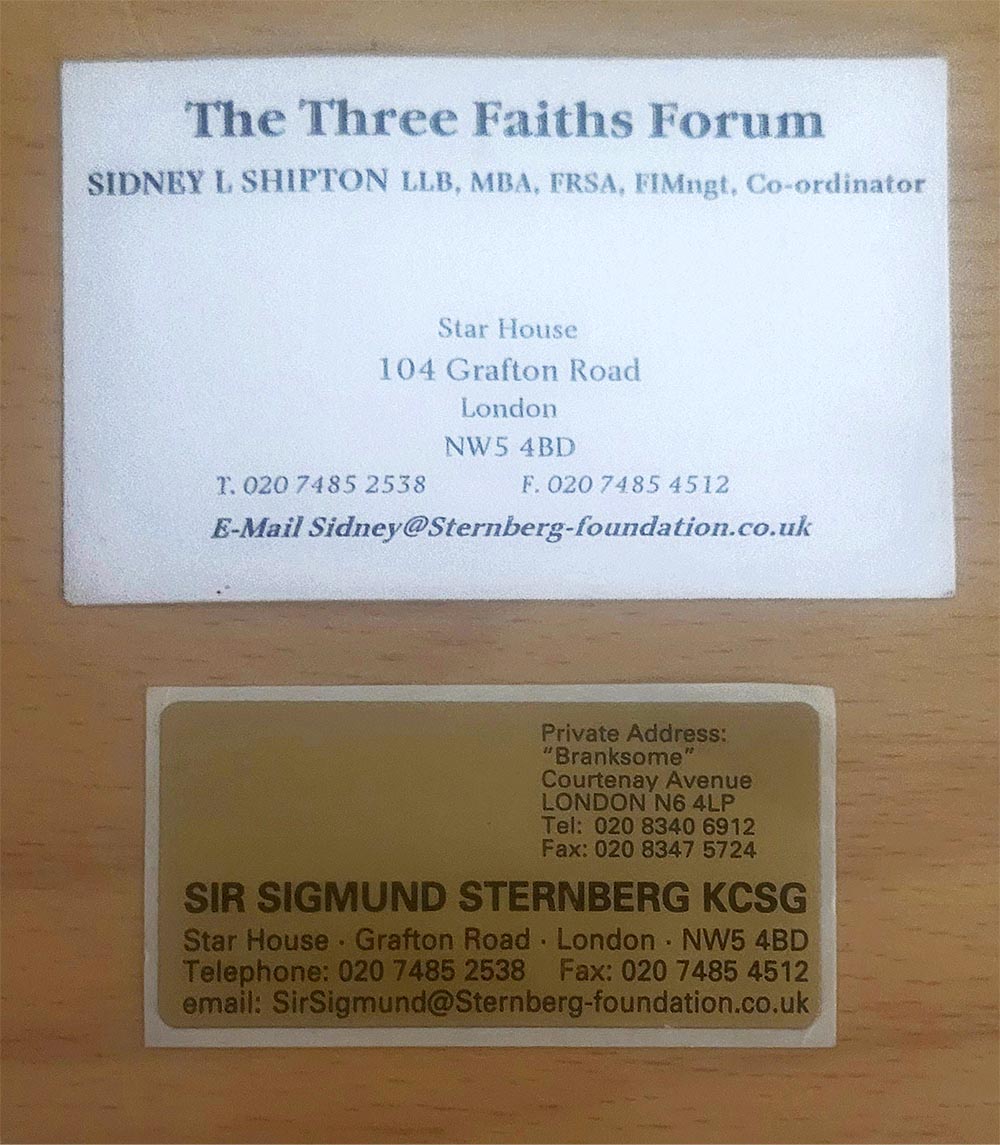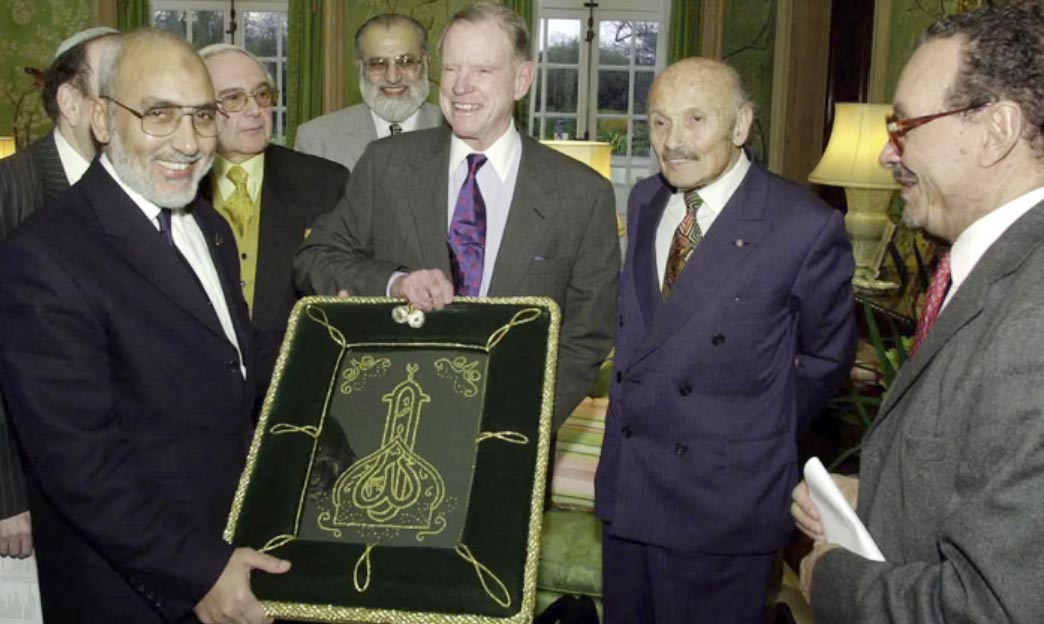

Above is a photo of the business cards given to me in, I believe, 2004 by Sidney L Shipton and Sir Sigmund Sternberg, two Jewish gentlemen who were very distinguished members of 'The Three Faiths Forum' and who were personal friends of my dear friend Sir Zaki Badawi, the senior Imam at the Central London Mosque in 1980 and later Dean of the Muslim College. Badawi was Egyptian as was my father and the two of them were great friends. All three of these formidable men - Badawi, Shipton and Sternberg - have passed away of course and each of them can be seen in the photo below featured in The Guardian's obituary on Sir Sigmund. Sidney Shipton is wearing the yellow tie and shirt. Sir Sigmund is second from the right and Sir Zaki Badawi is on the far right. The American ambassador is in the middle.
I have never forgotten my - all too brief - chats with Sidney Shipton and Sir Sigmund Sternberg at a Zaki Badawi lecture in, I believe, 2004, for the sole reason that here were two truly remarkable Jews - honourable beyond measure - who liked Islam and the prophet Muhammad. Yes, indeed! Sidney Shipton told me that he would be available "anytime anywhere" to give a talk on the prophet Muhammad and Judaism and Christianity and to just get in touch with him if I could find an audience he could speak to. I could have wept with joy at hearing this generous offer from Sidney! As for Sir Sigmund Sternberg, after listening to him talk about the Middle East I told him: "If only you were Prime Minister of Israel!". He replied in an accent which reminded me of actor Sir Laurence Olivier in the film 'The Boys from Brazil': "If I were Prime Minister, there would be peace!". If ONLY, given the hell of Gaza/Palestine/Israel we see now. I often think of Sidney Shipton and Sir Sigmund, and I pray God gives them the most generous of blessings in the next life. Great men.
Farid El Diwany
Obituary
Sir Sigmund Sternberg obituary
Businessman and philanthropist who founded the Three Faiths Forum, a dialogue group of Christians, Muslims and Jews

Sir Sigmund Sternberg, second right, at a reception given by the US ambassador to Britain, William Farish, second left, for the Three Faiths Forum in 2002. The ambassador is accepting an Islamic tapestry from Hany el Banna, left, watched by Zaki Badawi. Photograph: John Stillwell/Empics
Sir Sigmund Sternberg, who has died aged 95, was one of Anglo-Jewry’s most active members, present at seemingly any important communal occasion – a banquet addressed by the chief rabbi, a meeting called in honour of an Israeli prime minister, or, most likely of all, representing Britain’s Jews at an interfaith occasion.
At almost every appearance, the decorations he wore seemed to multiply: because of his work for inter-faith relations, he was constantly being presented with medals, from countries ranging from Argentina to Ukraine.
He was born in Budapest, son of Abraham and Elizabeth Sternberg, antiques dealers, and escaped to Britain in 1939 to avoid being transported to a death camp. As a young man, starting from a scrap-metal dealership, he set up a business empire, and from 1971 until his death was chairman of the property company Martin Slowe Estates.
Later, he headed a firm marketing computer software. However, by the mid-1960s he had begun to devote much of his time to charitable interests, the first being the Sternberg Foundation, established in 1968.
His interests were diverse. He was a member of the Board of Deputies of British Jews and was deputy chairman of the Labour finance and industry group from 1972 until 1993 – at the same time as being vice-president of the Royal College of Speech and Language Therapists and chairman of the Institute for Archaeo-Metallurgical Studies.
In 1976, Sternberg was one of those who appeared on Harold Wilson’s famous “lavender list” – the collection of names put together by the prime minister’s secretary, Marcia Falkender, for honours on his resignation. Sternberg was knighted for his services to his adopted country and was said to have been considered for a peerage.
In 1985 he was made KCSG – a papal knight commander of the Order of St Gregory the Great – by Pope John Paul II, and often attended functions thereafter in the bottle-green ceremonial uniform of a Catholic knight. He recalled: “My first active encounter with Christianity was as a youngster in my native Hungary when I was beaten up because, as my assailant explained, as he piled in the punches, ‘the Jews killed Christ’. That experience put me on a lifelong journey both to understand the passion that lay behind the attack and to explain my own faith to Christians who would listen.”
He did more than just talk about such things. He was partly responsible for the Vatican’s recognition of the state of Israel in 1993. He had also helped to organise the first visit by a pope to a synagogue, in 1986 by John Paul II. But he was not beyond criticising the Catholic church and pressed for the files to be opened on John Paul’s wartime predecessor Pius XII – an alleged Nazi sympathiser.
Honours came flooding in every time he took on some new office or other. Rotary International made him their Paul Harris fellow in 1989. In gratitude for his work as president of the reform synagogues from 1998 onwards, the movement named their headquarters at Finchley, north London, the Sternberg Centre.
Many of Sternberg’s awards came for his work as patron of the International Council of Christians and Jews and as founder in 1997 of the Three Faiths Forum, a dialogue group of Christians, Muslims and Jews. In 2003, he went to Romania to help set up a similar group. He said: “One wonders if, had there been such dialogue groups in the past, would the Holocaust have happened?” For his interfaith campaigning, he won the 1998 Templeton prize for progress in religion.
Sternberg’s second wife, Hazel (nee Everett-Jones), whom he married in 1970, died in 2014. He is survived by their son, David, and daughter, Ruth; and by a son, Michael, and daughter, Frances, from his first marriage, to Ruth (nee Schiff), which ended in divorce.
• Sigmund Sternberg, businessman, philanthropist and campaigner, born 2 June 1921; died 18 October 2016
The Guardian
Michael Freedland
Sun 23 Oct 2016
Original article HERE
